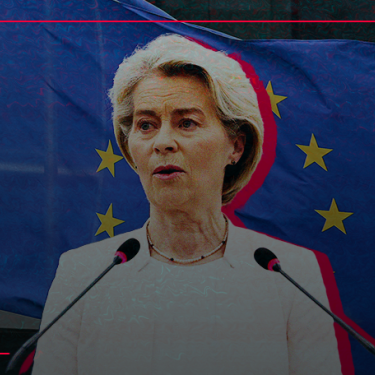RSF’s five recommendations on combating foreign interference in the EU’s information space

The current policies in democratic nations to combat foreign interference in the information space are a double-edged sword for press freedom. To curtail disinformation, propaganda, and the democracy-destroying traps set by despotic and authoritarian regimes, Reporters Without Borders (RSF) calls on the EU to adopt five key measures that protect the right to information and promote reliable journalism.
Ursula von der Leyen, newly elected for a second term as European Commission president, has pledged to “strengthen the Union’s capacities” to respond to malicious foreign interference in the information space. Such interference can take many forms, including cyberattacks, transforming public media into state-controlled media, acquiring stakes in foreign media with malicious intent, and disseminating false information on social media.
Yet the policies used by democracies to combat foreign interference are exploited by authoritarian regimes and used as justification for censorship, from the “foreign agent” laws that persecute independent media and journalists in Russia, Georgia and Hong Kong, to the exclusion of foreign independent media from the domestic information space in Russia, China and Iran.
Democracies that retaliate by censoring their adversaries’ malicious content fall into a trap, as this response gives credence to the reciprocity claims used by the governments of authoritarian countries. The EU decision in 2022 to ban the broadcasting of Russian propaganda media outlets Sputnik and RT (the former Russia Today) was justified on the basis of the outlets’ malicious content, but in practice the decision appeared arbitrary because it was not taken by an independent media regulator.
Combating malicious foreign interference in the information space in a democratic way is not just desirable, but possible. It requires better regulation of digital platforms, strengthening the authority of national media regulators, and more active support for reliable news media.
“Debunking, protecting and promoting are the three key ways to combat foreign interference in the information space. Democracies must satisfy the dual requirements of efficacy and leading by example in their battle against disinformation and propaganda. They must recognise that malicious foreign interference exists, expose it and then combat it without using the same methods as their adversary. To this end, RSF calls on the European Union to prioritise promoting and supporting reliable, independent journalism as an effective antidote, and as a way to expose and analyse foreign destabilisation campaigns before it is too late.
During her campaign for reelection as European Commission president, Von der Leyen proposed creating a European version of Viginum, a French governmental agency tasked with monitoring and protecting against foreign digital interference. The European Viginum’s role would be to coordinate the detection of malicious foreign interference operations in all EU member states.
Exposing disinformation by authoritarian regimes is a commendable and necessary first step, but it is not enough. To rise to the challenge facing European democracies, RSF proposes that the EU should complement a European Viginum with the following five measures:
-
Set up an obligation for digital platforms to promote reliable sources of information that are identified on the basis of a system such as the Journalism Trust Initiative (JTI) – an international certification that encourages and rewards trustworthy journalism;
-
Ensure that the same rules for pluralism and accuracy apply to all broadcast media within the EU regardless of their method of transmission and their country of origin, and simultaneously strengthen the role of national regulators;
-
Establish a system to protect the information space within the EU that is based on the principle of reciprocity vis-à-vis third countries;
-
Support the resettlement and the continued work of foreign journalists and media that have fled to the EU because they were persecuted due to their journalism in their home countries;
-
Help make reliable news sources available to more people living in countries that oppose press freedom.
